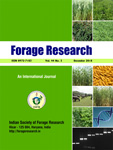P. BHASKER*, P. K. GUPTA, S. S. BORADE, C. TIWARI AND G. SURESH
Department of Botany and Plant Physiology, CCS Haryana Agricultural University, Hisar-125 004 (Haryana), India
National Horticultural Research and Development Foundation, Regional Research Station, Nashik-422003 (Maharashtra), India
National Horticultural Research and Development Foundation, Regional Research Station, Karnal-32001(Haryana), India
*(e-mail : bhaskarhau@gmail.com)
(Received : 6 September 2023; Accepted : 18 November 2023)
SUMMARY
A significant obstacle to cowpea [Vigna unguiculata (L.) Walp.] cultivation is weeds. There was an experiment was arranged in filed under all India coordinated research project – vegetable crops (AICRP-VC) on cowpea variety Kashi Kanchan to minimize the weed infestation during Kharif season. The seven different weed management strategies were tested in Randomized Block Design. The combined findings of three years showed that weed free check had the superior weed control efficiency, plant growth, development and pod production while the strategy having a very high investment cost in comparison to other weed management approaches. The black polythene mulch treatment outperformed other weed control methods in terms of weed flora reduction, weed control efficiency, crop growth, development and yield, albeit the treatment is also quite expensive. The PE application of oxyfluorfen @ 150 g ai/ha + one hand weeding at 35 – 45 DAS had the best weed control efficiency, pod yield and benefit cost ratio (1:2.07) followed by PE application of pendimethalin @ 1.0 kg ai/ha (1:2.06). Based on three years period results revealed that using plastic mulch is the most effective technique to control weeds than applying herbicides which had an economically cheap.
Key words: Cowpea, efficacy, herbicide, plastic mulch, weed population

